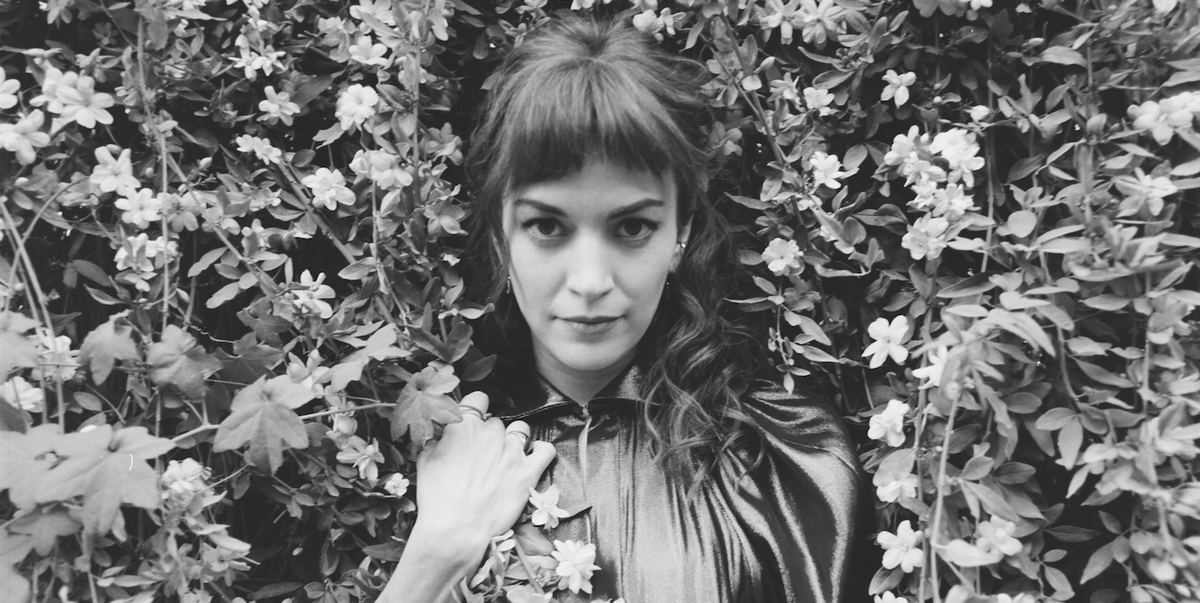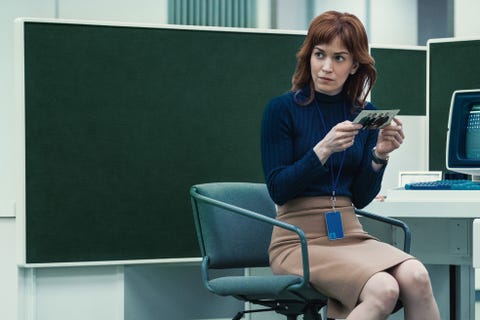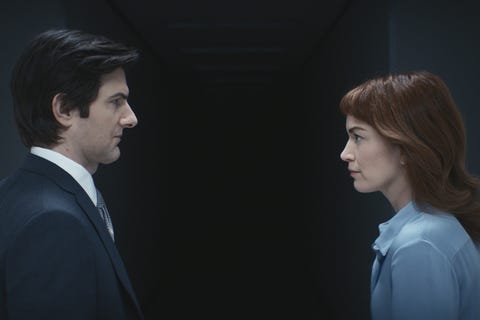Major spoilers below for Severance season 1.
I watched the Severance finale at my corporate office, under the glare of fluorescent lighting. In hindsight, this was a blatantly stupid decision: The Apple TV+ series capitalizes on the inherent spookiness of its white-walled, windowless office space to invoke the show’s persistent sense of unease. But, like most of the series’ slow-growing but passionate fanbase, I was hooked from the moment I had started the episode, and the only chance I had to squeeze in a watch was during a break from work. (The irony is not lost on me.) When Britt Lower, who plays the headstrong data analyst Helly throughout Severance’s nine-episode first season, signed on to Zoom, she points out my macabre surroundings: “We are all Helly,” the actress jokes.
Of course, the question of who Helly is becomes a central theme in Severance, most prominently in the season finale. As one of four employees in the Macrodata Refinement (MDR) department at the mysterious Lumon Industries, Helly is a severed “Innie,” which means she knows nothing about her life outside of Lumon’s four walls. Her “Outie”—the one some might describe, perhaps incorrectly, as the “real” Helly—knows nothing about what her Innie does at Lumon. They live perfectly separate lives, each an amnesiac when it comes to the other’s existence. We learn early on that Outie Helly wants it this way, and Innie Helly does not. But it isn’t until the finale that the devastating truth sharpens into focus: Outie Helly is an Eagan, a daughter of the god-like Eagan clan that founded Lumon Industries and invented the severance procedure. Presented as Christ-like figures amongst the Lumon employees, the Eagans are untouchable, perpetually absent but for a collection of wax statues and other paraphernalia, a replica of Kier Eagan’s home, and a handbook written by the same man, which functions as a literal and figurative company Bible. In other words: The Eagans are creepy, which usually means bad news in a sci-fi story like this. Lo and behold, Lumon is up to plenty of dodgy activities, though none of the Innies know precisely what. When Innie Helly and her fellow MDR employees, including Mark (Adam Scott), Irving (John Turturro), and Dylan (Zach Cherry) stage a grand escape through the so-called “overtime-contingency” protocol, she enters her Outie’s consciousness. After she “wakes up” at a Lumon gala, she discovers she’s a member of the family behind her own imprisonment.
To help us process the all-around heart-pounding finale—we haven’t even talked about Mark discovering his long-thought-dead wife is actually a Lumon employee—Lower dutifully answered as many of our questions as she could. Even the one about baby goats.
What drew you, initially, to what—at least on paper—is a really bizarre show?
The character. First, she’s the most defiant, brave, unapologetically honest person I’ve ever countered on a page. And as myself, [someone] who was such a rule-follower growing up, it was exciting to jump into the shoes of someone who does not care what anyone thinks about her. And is on a very clear mission to get out of this place at all costs, to challenge these rules that she’s been presented with that make no sense to her ethically. I think the heart of the story, for me, is about identity and her longing to know who she is at the core. That’s such a basic human need, to know who we are. For her to wake up with no memory—the color of her mother’s eyes, for example—is so heartbreaking.
Helly is one of the only MDR folks who is really pushing the others to question their surroundings. They’re all perhaps aware that something is off, but she’s the one who ignites the action. Why do you think that is? And why is she the one so hellbent on finding answers in the first place?
I think each of the characters probably had their own version of rebellion when they first came into the office. But so much time has passed that they’ve settled into a status quo. Helly operates as our point of view, in the audience, as to what it would feel like, viscerally, to wake up after having done this surgery. I think it’s quite powerful that someone who was raised in the Eagan family lore, inside of Lumon, in all the conditioning that Lumon does—it makes sense to me that her inner self would have a lot of rebellion pent up, even more so than any other person who’s come through the office before. It’s a lot of rebel repression.
So what was it like for you to get into that headspace? You have to be able to separate the two “characters” in your mind, to a degree, but you’re playing them both.
Yeah. I obviously approached them as the same person, but two parts of the same person. Outie Helly represented the ego, the conditioning of a life of memories. The nurture, if you will. And then Innie Helly was more of an angsty teenager, presenting the id that has no conditioning and is unburdened by the stories she’s been telling herself her whole life.
So it’s an interesting question. I mean, which part is more at core who the person is? I think that’s a question that the show is asking. And as an actor, I approached it very physically. If you think about someone who is presenting often—the outside Helly is often in a presentational mode, whether it’s recording a video or speaking to an audience, whereas Innie Helly doesn’t care how she’s presenting to the world. And there was something interesting for me about the restrictiveness of [Innie Helly’s] clothing that was really informative for me. Being in these restrictive office clothes, and heels, and panty hose, that made me want to rebel from the inside.
Which episode of season 1 is your favorite, not only as the actress but as an audience member?
I think probably [“Defiant Jazz”]. It was so fun because I’m wearing a yellow dress for the first time in the show. I felt sunnier. There was music, and instead of fluorescent lights, we had these amazing disco lights going. We were all discovering our hips for the first time. That was the most fun day ever. I could watch it over and over again.
What about the finale? What was your reaction when you actually watched the finished version?
Well, when I watched the finale, I was taken back to the first moment I entered that room full of something like 48 images of me in black and white, 12 feet by 12 feet, huge cubes. It gave me vertigo. It’s overwhelming for anyone to see that many images of yourself. But to be in the shoes of Innie Helly, discovering this betrayal of herself by herself, by her family—it was so disorienting. And to be in this gown, to be in a totally different outfit than the office and to see herself in the mirror? I just leaned on the physical aspect of it. That was bizarre.
Did you know from the very beginning about that twist, that Helly was going to be revealed as an Eagan?
Once I was cast, yeah. I did know pretty early on and…Whew. To this day, I’m in the dark about what Lumon does. It felt for me, especially for season 1, that it was important to—since my character doesn’t know what the numbers are, what the codes are for, for me not to know as well.
Do you know any of the Lumon secrets? Like, for instance, why there have baby goats?
I have no clue.
I love that, to be honest. I’d imagine that makes it more fun to feel like you’re solving the puzzle as you go along.
Yeah. It makes it more alive. And I can really focus on the journey of being hungry for answers, just like the audience is right now.
I want to address another bombshell moment in the finale: when Helly kisses Mark before entering the elevator. The affection between them grows so slowly throughout the season that it’s almost unnoticeable. But that moment feels huge—and not only because we now know Mark’s wife is alive and a Lumon employee. So how did you and Adam think about the growth of Helly and Mark’s relationship over the course of nine episodes?
It’s interesting because, initially, Helly believes that it’s her bosses and the company who are keeping her trapped. So a lot of her animosity is directed towards Mark and Miss Cobel and Mr. Milchick and the system itself. It’s like woman versus machine. And when that flips and she realizes that it’s actually herself keeping her there, the story becomes much more about self versus self. And I think it’s in those episodes where she and Mark… Mark [is] calling into question the nature of the work for the first time and reading the Ricken book. So his whole philosophy is starting to crumble at the same time. And I think they come into an alliance in that mutual questioning. They’re so suited as friends to begin with. There is a natural chemistry between the way they banter with each other and, because the circumstance stakes are so high, romance isn’t entering in until they’re on a level playing field.
So a lot of what Adam and I talked about was that rebellion is like currency between the two of them. Mark, even in the first couple of episodes, you’ll see him start to break the rules a little bit. Helly sees that, and it becomes a secret language between the two of them.
Another moment from the finale, one I think says a lot about Helly, is when she offers to stay behind at Lumon instead of Dylan. Ultimately Dylan does stay behind to initiate the overtime-contingency protocol, but still—the fact that she offered was interesting, given how desperate she is for answers. Why do you think that moment was included?
I love that you pointed that out. It was an important scene for me, too, in understanding that there’s a big part of Helly who has started to consider them family. [That’s] a pivot from earlier in the season, when she says to Mark, like, “I would never want to be your family.” I think, through the experience of grappling with what the hell’s going on together, she started to fall in love with Dylan and Irving and Mark. It touched me that it was like, she wants so desperately to find out who she is on the outside, to get to her family of origin, and that the obstacle becomes, Yeah, but if I leave then I lose this family.
Alright, last scene: the one in the bathroom. Outie Helly is staring at her reflection in the mirror, processing that she is an Eagan and has severed herself. Her father comes in to speak with her. What was filming that scene like?
It’s a delicate balance of trying to figure out how good of an actor innie Helly is, and how much she’s containing her hatred for this company and disdain for herself on the outside. It was a very tense scene to film and quite eerie. I think, at the beginning, when she first sees him, she recognizes him from the statue, the wax statue. And [the MDR employees] told each other before they leave to try to find someone you can trust. And so far, she knows she can’t trust any of the people that she’s encountering. I think there’s a split second where she’s like, Can I trust this guy? He’s my dad. But then it becomes very clear, based on his demeanor, that he’s not someone to be trusted.
Was the majority of the filming experience eerie like that?
Well, the fluorescent lighting and windowless office, I think, would have an impact on anyone. And it is purposefully that way for the show’s aesthetic. Luckily we would have mask breaks, so we’d get to go outside and get a little bit of vitamin D. But, in general, it was a very warm set. Everybody was, in between takes, reminding ourselves of our humanity and having a good time.
The show’s officially been renewed for season 2. If you could be the one to write the next chapter, what do you want to see happen next, for Helly in particular?
I think the sort of philosophical question for myself is, What do the different parts of Helly have to learn from one another?
I think [a] question at the core of the show is like, Does forgetting about the painful parts of life make things better or not? What was really important for me, playing Helly, was to convey what she values most is her freedom and autonomy. And when those are taken away, she goes to great lengths to fight back against a system that she feels is unethical. So that brings up for me, the next big question is like, When is it a good idea to break the rules in order to preserve one’s sanity and humanity?
This interview has been edited and condensed for clarity.
This content is created and maintained by a third party, and imported onto this page to help users provide their email addresses. You may be able to find more information about this and similar content at piano.io


